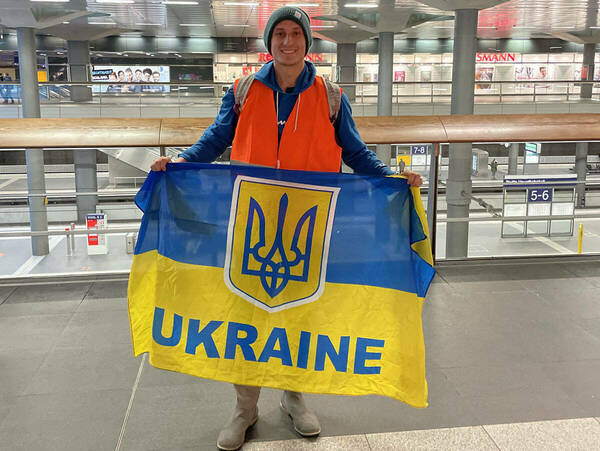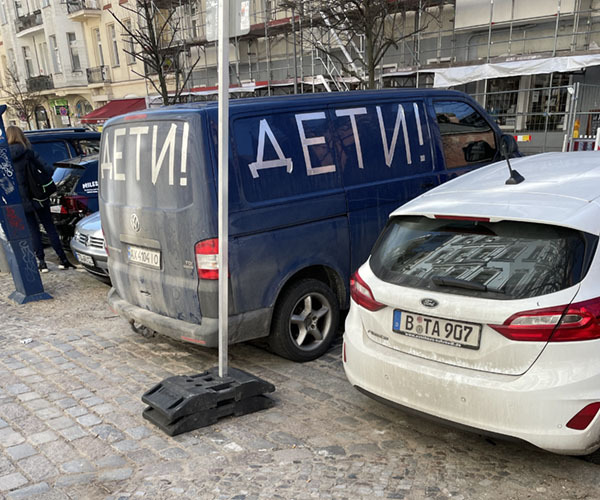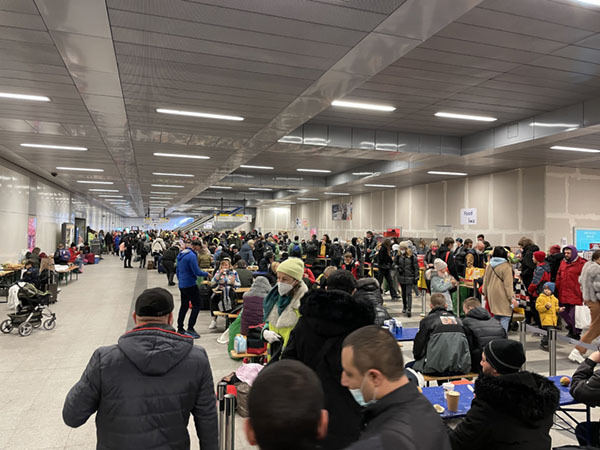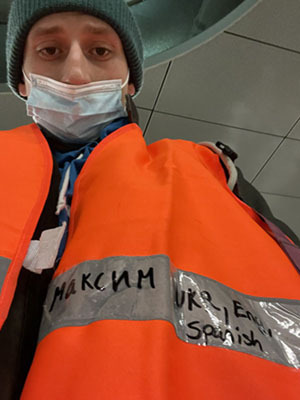
Over spring break, Max Chuma, a senior in the Mendoza College of Business with a concentration in transnational European studies, traveled to Germany as part of a Nanovic Institute for European Studies experiential learning course “Europe Responds to the Migration Crisis: The Case of Germany.” Led by Bill Donahue, professor of German, European studies, and Cavanaugh Professor of the Humanities, Max and his classmates spent a week meeting with federal, state and local governmental officials, civil society groups, and representatives of international organizations, many of whom discussed the recent arrival of large numbers of Ukrainian refugees in Berlin. At the end of the week, Max, the grandson of Ukrainian refugees during World War II, decided to go in person to Berlin Hauptbahnhof, the central train station, to see how he could help. As he explains below, “I would never have predicted that on the final day of our Berlin migration class trip I would see my grandparent’s tragic story repeat itself before my eyes.”
After my freshman year at Notre Dame, I spent the summer completing the Summer Service Learning Program through the Center for Social Concerns at the U.S.-Mexico Border in El Paso. For ten weeks, I co-managed Annunciation House, a shelter for migrants that has been operating since the 1970s. As the grandson of Ukrainian refugees during the Second World War, my motivation to undertake this placement was to see how the journey of refugees had changed since the 1940s.
All four of my grandparents fled Ukraine to escape political and cultural persecution by Nazi Germany and the USSR. Their story has been at the core of my identity as a native Ukrainian speaker and proud Ukrainian American. During my time in El Paso, I lived in solidarity with people coming from Honduras, Guatemala, and other South and Central American countries that had been plagued by crime and corruption. The experience opened my eyes to the desperation that continues to exist today caused by the systemic oppression faced by those fleeing the countries in which they are born.

I left El Paso with a new perspective on the migration crisis and I wanted to learn more about how other countries were handling the issue. I jumped on the opportunity to travel to Berlin with Professor Bill Donahue’s Spring 2022 course on migration and Germany. When I applied in the fall, my expectation was that I would be focused on how Germany has accepted and integrated refugees from North Africa since then-German Chancellor Angela Merkel, in the context of the 2015 refugee crisis, said “Wir schaffen das" (“We can manage this”).
I would have never guessed that two weeks before our departure, Russia would invade my ancestral homeland of Ukraine and spark a new wave of refugees, the pace and enormity of which has not been since the period when my grandparents fled Ukraine almost eighty years ago. I would also have never predicted that on the final day of our Berlin migration class trip I would see my grandparent’s tragic story repeat itself before my eyes.
This last day had been reserved for us to experience Germany as tourists, but I knew from the discussions my class had with migration researchers and Berliners alike that there was a great need at the central station: multiple evacuation trains from Poland were arriving each day in Berlin full of Ukrainian women and children. By midweek, the German news was reporting that over 2.5 million Ukrainian refugees had fled their homes and that a significant portion were coming to Germany. My sense of motivation to go to the central station was reinforced when I left the hotel and saw a blue Ukrainian van with “дети,” meaning “CHILDREN” in Russian, in bold duct tape letters all around the sides, a plea to Russian troops not to attack during the escape.
I packed my empty backpack with as much food and water as I could carry and then arrived, alone, at the station. An entire floor was dedicated to Ukrainian refugees. After I donated my food, I joined a line to register as a volunteer. It was a chaotic situation, but there was a fairly clear process in place for the volunteers, which can best be described as simply registering and getting to work.

The volunteers were separated into German/English speakers and then Ukrainian/Russian speakers. I estimated the ratio was 10 non-Ukrainian speakers for every Ukrainian speaker. As a native Ukrainian speaker, I was given a special orange vest and told to display my name—which I did in the Cyrillic Максим—and the languages I spoke. From my observations, the volunteers ranged from local teenagers to retired couples. I could tell some had been there for several days because they understood the process, where to find supplies, and how to connect refugees to their specific needs. Some had even taken on leadership roles like walking around with megaphones and coordinating bus groups and schedules.
In addition to being locals, I think many had an advantage over me in that they had become somewhat numb to the tragedy and trauma of the situation. I was shocked by how many young innocent faces I saw coming into the reception area. I called my own mother in tears, telling her over and over again, “they are just kids Mama. There are so many scared little kids.” She told me they were safe, and that all I had to do was to show them love, and to think of those who helped my grandparents.
German groups had set up tents for medical care for mothers or disability support, but, from my perspective, there was no formal leadership. Volunteers would just go to where there was a need or simply stand in place and answer questions for the anxious refugees. Most of their requests were for needs that were immediate and simple. In the morning, refugees wanted coffee and the volunteers scrambled throughout the station to find hot water and more instant coffee mix. By 2:00 p.m. the need had shifted to a warm lunch and finding enough utensils for each family. By the evening, sanitary products and toiletries became scarce as refugees began to formulate plans for where they would be spending the night in Germany.
I was pulled in nearly every direction, from explaining how to purchase tickets to other European cities, to consoling an anxious grandmother, to handing out food, to carrying children to the train. Due to the constant stream of people, none of my interactions with individuals or groups lasted more than 15 minutes but at each parting, I was motivated to return back to the chaos. One girl responded “thank you” when I offered her juice. I responded “I am from America!” and she announced with great pride “I am from Ukraine!” I asked another little boy, stunned and emotionless, what his name was. He whispered “Sasha.” When I told him my name was Max his mother told me that was the name of his father, who, as an adult male, I could only assume had been required to remain in Ukraine and defend the homeland. I worked for approximately five hours in total and the stream of women and children did not stop. In my last hour, the other Notre Dame students joined me and I helped them distribute fruit, candy, and toiletries we had purchased from the train station’s grocery store.

When I got tired or overwhelmed I kept returning because I wanted to be a source of good like my grandparents had needed when they were child refugees in the 1940s. I kept thinking about a story my grandfather told me about his first memory when he and his sister arrived by boat at the Ellis Island immigration processing center in New York. A stranger gave them an orange that they ate in secret. He had never tasted anything so sweet, and, to this day, it remains his first memory of the Western, free world.
As a full circle and to honor my grandparents’ bravery, even as small children, I bought oranges and passed them out to the Ukrainian children. I wanted the young, terrified faces before me to know they were welcome and that the evil they were fleeing would not find them in Berlin. As my cousin fights for his country’s freedom in Kyiv with the Ukrainian army, the least I can do is tell traumatized women and children, waiting with uncertainty in a cold, foreign train station, that there is hope.
Originally published by at nanovicnavigator.nd.edu on April 20, 2022. Nanovic Navigator is a platform for stories told by students about their experiences exploring Europe and European studies through the support of the Nanovic Institute.